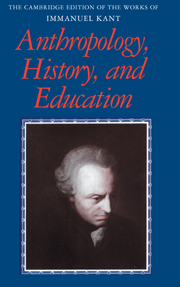Book contents
- Frontmatter
- Contents
- General editors' preface
- Preface
- General introduction
- 1 Observations on the feeling of the beautiful and sublime (1764)
- 2 Essay on the maladies of the head (1764)
- 3 Review of Moscati's work Of the corporeal essential differences between the structure of animals and humans (1771)
- 4 Of the different races of human beings (1775)
- 5 Essays regarding the Philanthropinum (1776/1777)
- 6 A note to physicians (1782)
- 7 Idea for a universal history with a cosmopolitan aim (1784)
- 8 Review of J. G. Herder's Ideas for the philosophy of the history of humanity. Parts 1 and 2 (1785)
- 9 Determination of the concept of a human race (1785)
- 10 Conjectural beginning of human history (1786)
- 11 Some remarks on Ludwig Heinrich Jakob's Examination of Mendelssohn's Morning hours (1786)
- 12 On the philosophers' medicine of the body (1786)
- 13 On the use of teleological principles in philosophy (1788)
- 14 From Soemmerring's On the organ of the soul (1796)
- 15 Anthropology from a pragmatic point of view (1798)
- 16 Postscript to Christian Gottlieb Mielcke's Lithuanian–German and German–Lithuanian dictionary (1800)
- 17 Lectures on pedagogy (1803)
- Editorial notes
- Glossary
- Bibliography
- Index
General editors' preface
Published online by Cambridge University Press: 05 May 2013
- Frontmatter
- Contents
- General editors' preface
- Preface
- General introduction
- 1 Observations on the feeling of the beautiful and sublime (1764)
- 2 Essay on the maladies of the head (1764)
- 3 Review of Moscati's work Of the corporeal essential differences between the structure of animals and humans (1771)
- 4 Of the different races of human beings (1775)
- 5 Essays regarding the Philanthropinum (1776/1777)
- 6 A note to physicians (1782)
- 7 Idea for a universal history with a cosmopolitan aim (1784)
- 8 Review of J. G. Herder's Ideas for the philosophy of the history of humanity. Parts 1 and 2 (1785)
- 9 Determination of the concept of a human race (1785)
- 10 Conjectural beginning of human history (1786)
- 11 Some remarks on Ludwig Heinrich Jakob's Examination of Mendelssohn's Morning hours (1786)
- 12 On the philosophers' medicine of the body (1786)
- 13 On the use of teleological principles in philosophy (1788)
- 14 From Soemmerring's On the organ of the soul (1796)
- 15 Anthropology from a pragmatic point of view (1798)
- 16 Postscript to Christian Gottlieb Mielcke's Lithuanian–German and German–Lithuanian dictionary (1800)
- 17 Lectures on pedagogy (1803)
- Editorial notes
- Glossary
- Bibliography
- Index
Summary
Within a few years of the publication of his Critique of Pure Reason in 1781, Immanuel Kant (1724–1804) was recognized by his contemporaries as one of the seminal philosophers of modern times – indeed as one of the great philosophers of all time. This renown soon spread beyond German-speaking lands, and translations of Kant's work into English were published even before 1800. Since then, interpretations of Kant's views have come and gone and loyalty to his positions has waxed and waned, but his importance has not diminished. Generations of scholars have devoted their efforts to producing reliable translations of Kant into English as well as into other languages.
There are four main reasons for the present edition of Kant's writings:
Completeness. Although most of the works published in Kant's life- time have been translated before, the most important ones more than once, only fragments of Kant's many important unpublished works have ever been translated. These include the Opus postumum, Kant's unfinished magnum opus on the transition from philosophy to physics; transcriptions of his classroom lectures; his correspondence; and his marginalia and other notes. One aim of this edition is to make a comprehensive sampling of these materials available in English for the first time.
Availability. Many English translations of Kant's works, especially those that have not individually played a large role in the subsequent development of philosophy, have long been inaccessible or out of print. Many of them, however, are crucial for the understanding of Kant's philosophical development, and the absence of some from English-language bibliographies may be responsible for erroneous or blinkered traditional interpretations of his doctrines by English-speaking philosophers.
[…]
- Type
- Chapter
- Information
- Anthropology, History, and Education , pp. ix - xiiPublisher: Cambridge University PressPrint publication year: 2007

